 Petzlover
Petzlover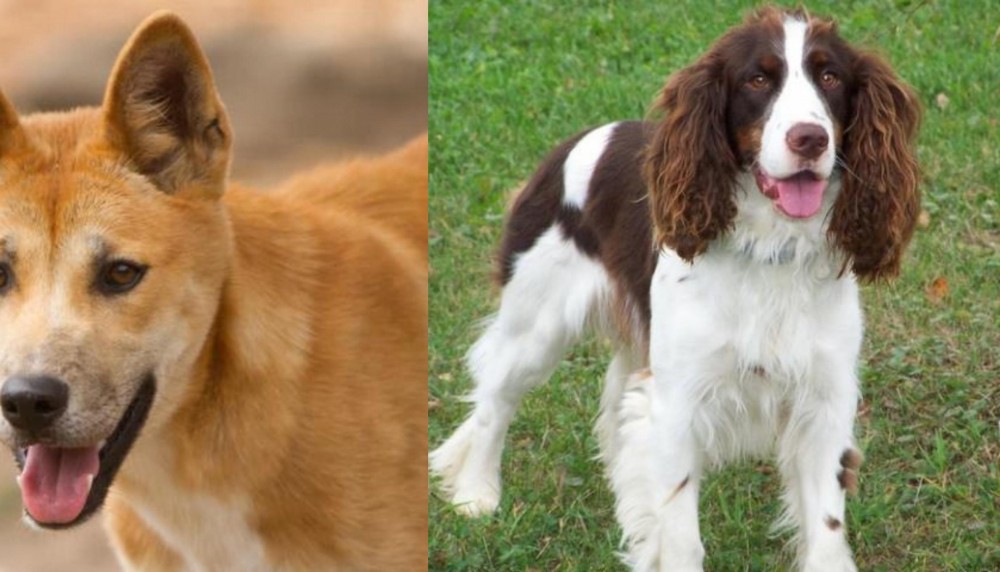 Dingo is originated from Australia but English Springer Spaniel is originated from United Kingdom. Dingo may grow 9 cm / 4 inches higher than English Springer Spaniel. Dingo may weigh 7 kg / 16 pounds more than English Springer Spaniel. Dingo may live 6 years more than English Springer Spaniel. Both Dingo and English Springer Spaniel has almost same litter size. Dingo requires Moderate Maintenance. But English Springer Spaniel requires Low Maintenance
Dingo is originated from Australia but English Springer Spaniel is originated from United Kingdom. Dingo may grow 9 cm / 4 inches higher than English Springer Spaniel. Dingo may weigh 7 kg / 16 pounds more than English Springer Spaniel. Dingo may live 6 years more than English Springer Spaniel. Both Dingo and English Springer Spaniel has almost same litter size. Dingo requires Moderate Maintenance. But English Springer Spaniel requires Low Maintenance
 The Dingo dog was in all probability, introduced to Australia thousands of years ago. He isn’t your usual domesticated dog and in fact it is a feral dog native to Australia.There are stories that suggest that while they may have once been pets, they were abandoned so that they reverted back to their wild state.
The Dingo dog was in all probability, introduced to Australia thousands of years ago. He isn’t your usual domesticated dog and in fact it is a feral dog native to Australia.There are stories that suggest that while they may have once been pets, they were abandoned so that they reverted back to their wild state.
They became pests for Australian farmers, going for their livestock, and huge fences were erected. The different climates in Australia have meant different kinds of Dingo developing, so while the desert ones are like the desert sands - golden yellow to red the alpine ones are rarer and are cream colored.
These wild canines were also introduced to Southeast Asia some 3,500 years ago, however the dog’s exact origin is debatable. There are any number of groups of people who could have brought the dingo to Australia, and among some of these are Indian mariners or maritime hunters.
The dog has been found in many parts of mainland Australia but never became established in Tasmania.There has also been an effort to remove the Dingo from farming areas. It is interesting to note that the first Dingo, referred to as the Australian dog, was registered at the London Zoo in 1828.
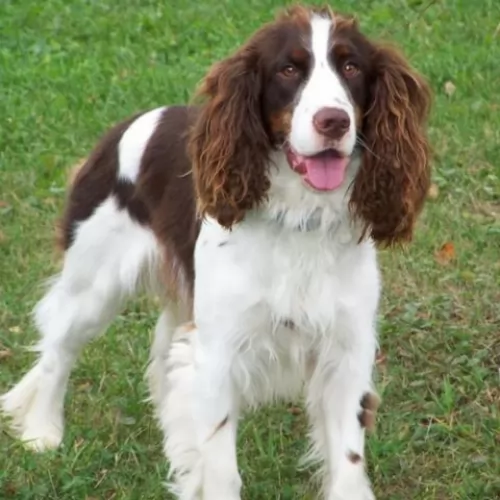 The English Springer Spaniel is one of many gun dog breeds that flush and retrieve. They descended from the Shropshire Spaniels and Norfolk Spaniels. The English Springer Spaniel is somewhat similar to the Welsh Springer Spaniel and believe it or not they are also closely related to the English Cocker Spaniel. In the last century the cockers and springers came from the same parents. The larger dogs flushed game and made game “spring” from the brush while the smaller dogs – the “cockers” would hunt woodcock. Eventually through specific breeding, the UKC of England recognized the “springers” as a separate breed.
The English Springer Spaniel is one of many gun dog breeds that flush and retrieve. They descended from the Shropshire Spaniels and Norfolk Spaniels. The English Springer Spaniel is somewhat similar to the Welsh Springer Spaniel and believe it or not they are also closely related to the English Cocker Spaniel. In the last century the cockers and springers came from the same parents. The larger dogs flushed game and made game “spring” from the brush while the smaller dogs – the “cockers” would hunt woodcock. Eventually through specific breeding, the UKC of England recognized the “springers” as a separate breed.
Sydenham Edwards, in 1801, proposed that the spaniels be divided into the Springing or Hawking Spaniel and the Cocking or Cocker Spaniel. From this point on there was a flourish in the development of spaniel breeds in the 19th century. They were usually named for the county in which they were founded or after the individual who developed them. In 1902, the English Springer Spaniel was officially recognized as its own breed by the UKC. It was not until 1910 that the AKC recognized them as well.
 An interesting fact with these fascinating feral dogs, is that like humans, they’ve got rotating wrists. This characteristic of theirs allows them to use their paws much like the human hand to catch their prey. A domesticated Dingo can therefore learn how to open doors.
An interesting fact with these fascinating feral dogs, is that like humans, they’ve got rotating wrists. This characteristic of theirs allows them to use their paws much like the human hand to catch their prey. A domesticated Dingo can therefore learn how to open doors.
The Dingo is a medium sized dog standing at roughly 52 – 60cm in height, measuring up to 1.2 meters in length and weighing roughly between 23 to 32kg.
He has long canine teeth, a long muzzle, upright ears and a long, thick tail. The coat is essentially one color, sandy, white, cream, tan or black and sometimes there are white markings on the chest, the paws and around the muzzle.
The fur is typically shortish and thick — though the hair's thickness and length will depend on the climate of the area. The Dingo is a moderate shedder and a good brushing of the coat twice a week will keep the thick coat shiny and healthy.
These wild canines are social animals, and in the wild they live in packs. There are some that opt to live on their own.
They’e territorial, but they are able to share their living space with humans. They’re generally shy around humans, but a Dingo that is trained and socialized can get along well with children and pets in the home.
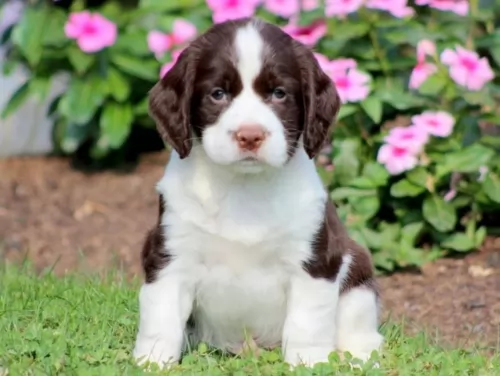 Among spaniels the English Springer is medium size and well compacted. Both the working dog and the show dog sport moderately long coats and a friendly tail. They both wear a gentle expression in their eyes. But there the commonality stops as the difference between the working English Springer Spaniel and the show line is greater in this breed than in any other. The gene pools have become almost separate over the last 70 years. If you put a field dog in the show ring they would not be able to compete. If you put a show line English Springer in the field, they would not have the stamina or speed for field trials.
Among spaniels the English Springer is medium size and well compacted. Both the working dog and the show dog sport moderately long coats and a friendly tail. They both wear a gentle expression in their eyes. But there the commonality stops as the difference between the working English Springer Spaniel and the show line is greater in this breed than in any other. The gene pools have become almost separate over the last 70 years. If you put a field dog in the show ring they would not be able to compete. If you put a show line English Springer in the field, they would not have the stamina or speed for field trials.
The field line has a coarser coat and less pendulous ears. They may dock a few inches off the tail, and they are much scruffier than the show dogs. On the other hand, the show dogs have dewlaps, pendant ears and dangling flews. They are heavier and thicker than the field dog. They have long muzzles, not so prominent eyes and docked tails. The English Springer Spaniel stands tall and proud, coming from an ancient line of Spaniels
 Dingoes have been domesticated successfully. Some people swear by them as making a fantastic pet. However, they’re wild dogs and can be unpredictable.
Dingoes have been domesticated successfully. Some people swear by them as making a fantastic pet. However, they’re wild dogs and can be unpredictable.
There are others who have tried to keep the Dingo as a pet but who have discarded them when they proved to be a danger in the home.
Dingoes can be trained but they’re high energy dogs and require a lot of exercise. How do you feel about owning a Dingo as a pet? Many people feel that its not fair to bring an essentially wild animal into your home. They feel that there are plenty of rescue dogs dying for a home without human beings searching in the wilds for an unusual pet, and regretting it later on.
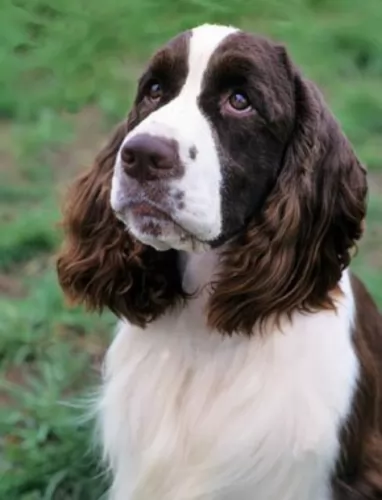 The English Springer Spaniel is a friendly dog who loves to please his people. They are great family dogs, easy-going and affectionate. In addition, they are attentive and alert which makes them such great hunting dogs. With exceptional speed and stamina, he needs activity to stimulate his body and brain. He is very intelligent. That intelligence can lead to stubbornness as well. He’d great with kids and good with other pets with perhaps the exception of cats. The breed is in love with water and will get in at any time.
The English Springer Spaniel is a friendly dog who loves to please his people. They are great family dogs, easy-going and affectionate. In addition, they are attentive and alert which makes them such great hunting dogs. With exceptional speed and stamina, he needs activity to stimulate his body and brain. He is very intelligent. That intelligence can lead to stubbornness as well. He’d great with kids and good with other pets with perhaps the exception of cats. The breed is in love with water and will get in at any time.
 The Dingo is a long-lived dog and you can expect your Dingo to live till anything between 15 and 20 years.
The Dingo is a long-lived dog and you can expect your Dingo to live till anything between 15 and 20 years.
When it comes to health issues, they are robust and resilient, having less medical problems to contend with than your regular dog.
However if you see that your Dingo is not his usual robust, energetic self, get him to the vet as soon as you can.
 Not an uncommon issue for most medium to smaller sized dogs. It can lead to lameness or arthritis.
Not an uncommon issue for most medium to smaller sized dogs. It can lead to lameness or arthritis.
Loss of vision due to a deterioration of the retina.
Clubs form in the retinal tissue and can lead to blindness.
The twisting or distention of the stomach that effects dogs with deep chests and can lead to death if not treated immediately.
 Caring for your Dingo will be different to caring for your usual pet dog. You have to remember the Dingo is an ancient, wild species with some unique characteristics. Having a Dingo as a pet and companion may not be an easy task, and it is why many people selfishly dump their Dingoes – they didn’t quite live up to what they had in mind.
Caring for your Dingo will be different to caring for your usual pet dog. You have to remember the Dingo is an ancient, wild species with some unique characteristics. Having a Dingo as a pet and companion may not be an easy task, and it is why many people selfishly dump their Dingoes – they didn’t quite live up to what they had in mind.
Your Dingo, just like any other dog you’d have, will require training and socialization, and the earlier the better. No training will simply mean you having an unruly pet in the home.
Your Dingo can be fed just like you would with your other dogs. You can feed him quality dog kibble as his main diet, but you can also add in cooked rice, vegetables and chicken. Your Dingo is essentially a wild dog, so you will definitely want to include some raw meat into his diet from time to time as well.
A Dingo is used to running free so he will require plenty of outdoor exercise. He can also be put on a leash and taken for a walk. He’ll love joining you in your activities such as running alongside you as you jog or cycle. He can adapt to life in the city if he is well exercised but he isn’t suited to a small home or garden.
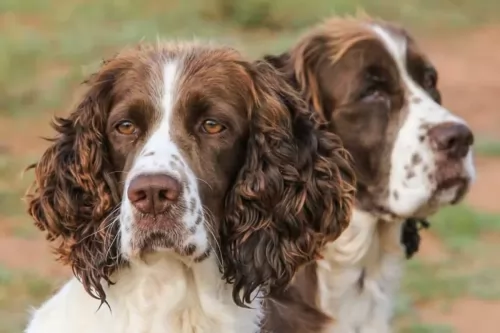 The English Springer Spaniel can gain weight easily and obesity is one of the biggest health issues for this breed. Feed them a high quality dry dog food. Working dogs need more energy and more calories than the inactive dog. An active member of the breed should have around 1353 calories every day in at least 2 meals if not 3. Do not feed a large meal before or after strenuous exercise as this can cause bloat.
The English Springer Spaniel can gain weight easily and obesity is one of the biggest health issues for this breed. Feed them a high quality dry dog food. Working dogs need more energy and more calories than the inactive dog. An active member of the breed should have around 1353 calories every day in at least 2 meals if not 3. Do not feed a large meal before or after strenuous exercise as this can cause bloat.
In addition to the health issues listed above the English Springer Spaniel is also prone to:
This is a genetic condition where the body cannot use the carbohydrates it takes in and convert it to energy. This is identified as a blood disorder.
Causes seizures but can be treated with medications.
With longer , droopy ears, infection is always a possibility. Clean them regularly and keep them dry.
The working English Springer Spaniel is a very energetic dog requiring daily exercise and loving to play. They love walks and hikes. They can excel in competitions such as rally, agility, tracking, field and obedience.